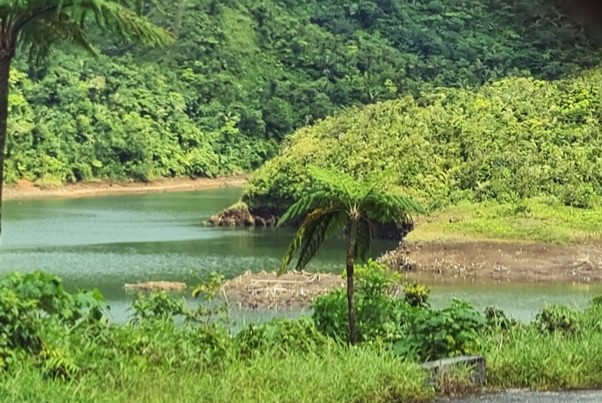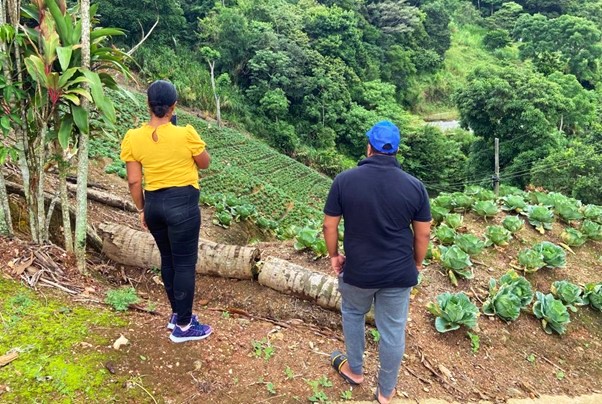|
“For at least, 2 decades, climate scientists have been issuing warnings about the impacts of climate change. These warnings no longer speak about the impacts in terms of a crisis, but in terms a catastrophic failure for humankind” |
Developing countries and small islands in tropical regions, such as in the Caribbean, have been feeling the brunt of the man-made phenomenon. The Barbados Prime Minister, the Hon. Mia Mottley, has used every opportunity, globally and otherwise, to emphasise that we, the developing countries, did nothing much to cause this catastrophe, yet we suffer the consequences.
In the Caribbean, these consequences are familiar, extreme hurricanes, extreme drought, and extreme flood, in and out of their typical seasons. These natural climate systems are seeming to be becoming supernatural, in their intensity, unpredictability and frequency, even impacting areas that have never-before been impacted by their fury.
What does this have to do with farming? Almost everything. Agriculture, which moved from small-scale, mixed systems to mega monoculture industries is a significant cause of climate change. Agriculture is also being called upon to become a significant solution to the problem.

Dominica’s iconic Freshwater Lake, a ‘shallow’ of its usual self
From July 2023, the Earth has been experiencing temperatures never recorded since records have been kept. This is much more than a heat wave; it is yet another signal, a warning that in the haste and pace for economic development, things have gone horribly wrong for our planet. In Dominica, concerns now abound that one of the island’s most iconic natural features, the Freshwater Lake, a sensitive ecosystem, and source for the island’s hydroelectric power generation, ‘is dying’, due to the abnormally low water levels.
Part of our haste and pace to become ‘developed’, included farming practices that are no longer viable or sustainable, and can no longer be justified, from any perspective. But one should not automatically always blame the farmers – they are only practicing what they have been taught, not necessarily what has been traditionally handed down. This is seen in terms of what a productive well-kept field should look like – neat and clean and not a weed in sight; that even a plant as beneficial as a tomato is considered a weed if it dares to sprout on a bed of roses or lettuce or some other prized food or horticultural crop; that clearing the entire farm to grow neat lines of papaya or some other single crop, is somehow a good practice.

A hillside farm somewhere in Trinidad
IICA’s climate change, soil and water specialist, Dr. Chaney St. Martin, uses simple language to give advice that is fundamental to the region’s ability to farm in climate change – leave no soil uncovered. Simple advice, but yet difficult to actualize. Proponents of regenerative agriculture for decades have warned of the negative impacts on soil from monoculture, from excessive weeding, tilling and ploughing.
The time to change farming practices is now! Caribbean farmers are used to high winds, pests and diseases; some have been devastated by hurricanes, and others farms swept away by floods and landslides. But this prolonged ‘heat stroke’ is not as familiar. For some farmers, it has taken them by surprise. In the past few weeks there have been several reports of death among poultry in Trinidad; crops in fields wilting from heat from above and below; and farm workers being cautioned to wear sunscreen and drink water in response to Met Office warnings about the continuing heat wave.
If it’s one thing that Caribbean farmers are known for, is being resilient and bouncing back after a loss, whether by flood or hurricanes, or theft. But it seems that nothing has prepared them for this excessive heat. What are the options? Some unlearning will have to happen, since what was taught before may no longer apply to the environment for farming today. Even with the focus on developing drought resistant varieties of the food crops, this heat wave is a call to take the most basic action – shelter our soils; do not leave them bare. Beyond the traditional recommendation of mulching to preserve soil moisture, make it a better practice to plant and maintain cover crops on the farm, in all areas, at all times. The soils, and your crops, will thank you for it.
Technical cooperation organisations in agriculture, including IICA, CARDI, UWI and FAO, Ministry of Agriculture Extension officers, and local practitioners in permaculture and regenerative agriculture, have the collective expertise and experience to advice farmers on the choice of cover crops based on the cropping system.
|
“It is time to stop searching for sophisticated answers when the solution is as simple and as old as time - ‘leave no soil uncovered’ |
Would you deliberately and repeatedly expose your skin to the sun, without protection, knowing full well, all of its harmful effects? Why do this to soil, the skin of the planet, and life-giver of farming. The answer is literally in our practices!
 Diana Francis is a graduate of the University of the West Indies (UWI), St. Augustine – BSc. Economics (1986-1989) and Cave Hill - MPhil Economics (1993-1996). She has been working in agricultural and rural development, providing policy and trade support since 1989, at the national level through the Ministry of Agriculture in Dominica, and from 1993, at the regional level, with the Inter-American Institute for Cooperation on Agriculture (IICA). She has provided direct support to CARCOM and the OECS Secretariat, and individual Ministries of Agriculture, in formulating Agricultural Policy and Strategy, emphasizing the importance of rebuilding strong planning capacity for effective policy implementation. She has authored/co-authored a number of publications and written pieces on a range of topics in agricultural development as well as develop and manage implementation of externally funded regional projects. As the current IICA Representative in Trinidad and Tobago (from July 2019), she manages IICA’s technical cooperation activity in collaboration with a number of strategic partners in areas related to climate resilience, agricultural health and food safety, community-based agriculture and rural development, food and nutrition and importantly, providing coordinated and holistic development support to micro and small agro-processors.
Diana Francis is a graduate of the University of the West Indies (UWI), St. Augustine – BSc. Economics (1986-1989) and Cave Hill - MPhil Economics (1993-1996). She has been working in agricultural and rural development, providing policy and trade support since 1989, at the national level through the Ministry of Agriculture in Dominica, and from 1993, at the regional level, with the Inter-American Institute for Cooperation on Agriculture (IICA). She has provided direct support to CARCOM and the OECS Secretariat, and individual Ministries of Agriculture, in formulating Agricultural Policy and Strategy, emphasizing the importance of rebuilding strong planning capacity for effective policy implementation. She has authored/co-authored a number of publications and written pieces on a range of topics in agricultural development as well as develop and manage implementation of externally funded regional projects. As the current IICA Representative in Trinidad and Tobago (from July 2019), she manages IICA’s technical cooperation activity in collaboration with a number of strategic partners in areas related to climate resilience, agricultural health and food safety, community-based agriculture and rural development, food and nutrition and importantly, providing coordinated and holistic development support to micro and small agro-processors.
Note: The opinions expressed in this article are the responsibility of the authors and do not necessarily reflect the opinion of IICA.
|
If you have questions or suggestions for improving the BlogIICA, please write to the editors: Joaquín Arias and Eugenia Salazar. |
Añadir nuevo comentario